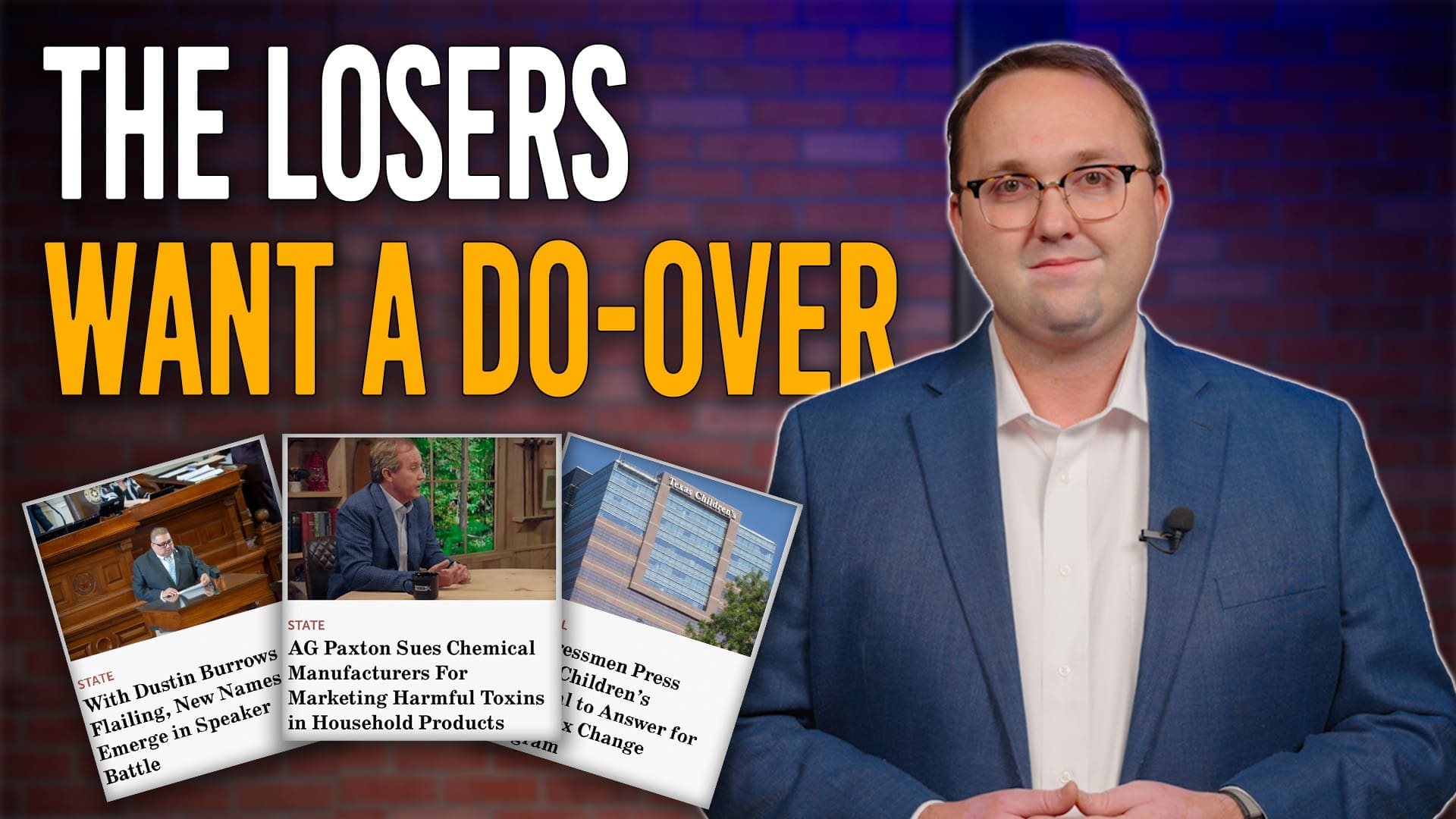State Sen. Van Taylor (R–Plano) has always been a man with a plan. Studying his legislative record in his two sessions in the Texas House and his session in the Texas Senate reveals a work ethic that is only rivaled by the deeply held conservative convictions that inform it. He is principled, approachable, wise, and effective.
Why he’s deciding to go to the place where all those qualities go to die is beyond me, but — state senator or congressman-elect — Van Taylor is ready to go to Washington D.C. and bring his lessons from the Texas Legislature with him.
I sat down with him recently at his Plano home and discussed the hallmarks of his state legislative tenure and what they can tell us about how to handle the challenges the federal government faces today.
Taylor hasn’t only made a name for himself as an elected official, but as a soldier and businessman as well. When I asked him how he got to where he is today, he described the winding journey that led him to public office.
I was born in Dallas, [a] 7th generation Texan. After college I served in the Marine Corps and led a platoon in Iraq as a reservist in 2003. I’ve been active in business, started at the firm I’m working at today in 2002 and am still there, and I’ve been on the board of a bank for the last 12 years. We’ve grown 200 percent in 12 years, which has been great. Then I was elected to the Texas House in 2010 and Texas Senate in 2014 and was very humbled to be elected to the U.S. Congress in the 3rd Congressional District, which is basically most of Collin County in terms of population, for the 116th Congress.
Between evacuating dozens of wounded Marines and being the captain of one of the first missions in Operation Iraqi Freedom, Taylor served with distinction. For his exemplary service, he was decorated with the Navy Commendation Medal, the Combat Action Ribbon, and the Presidential Unit Citation, an award reserved for units that demonstrate extraordinary heroism in action against an armed enemy.
Taylor’s service gave him unique insight into the challenges facing veterans. One of his first legislative acts, a monumental task for a fledgling legislator in a gridlocked chamber at the time, was passing sweeping reforms making it possible for Texans fighting abroad to vote, an effort which received overwhelming bipartisan support.
“Bipartisan” is always a tricky word in Texas politics. Crony Republicans frequently get together with crony Democrats and pass giveaways for corrupt unions and big corporations, all under the guise of bipartisanship. Unprincipled legislators will often renege on campaign promises, voting with moneyed interests and call that bipartisanship. Taylor’s record, on the other hand, placed him as consistently one of the most conservative legislators in the state, all while passing meaningful bipartisan reforms at a breakneck pace.
It paid off. In an election year that saw Collin County Democrats performing better than they have in decades, Taylor outperformed the rest of the Republican ticket. I asked him why he thought that was.
Well, I think if you want to get promoted, do a good job. And so as a member of the Texas Senate, and Texas House before that, in eight years I passed 81 pieces of legislation. Every one with bipartisan support so clearly had a strong track for getting Republicans and Democrats together to find real solutions for real problems, many of which affected the people of Collin County.
I’ve always had a 100 percent meeting policy, so every constituent that’s ever asked to have a one-to-one meeting has gotten that, as many as they want. I believe that I’m accountable to the people that I work for. And so, I think that a record of success and accessibility … those two things … they really resonated with people. And they say, ‘Here’s someone who has been successful and promises to do well for the future.’
In the aftermath of the 2016 elections, as the far-left base of the Democrat party boiled over with rage, many Republican elected officials decided to close their doors to their constituents, afraid to deal with backlash from the people they serve. Taylor, however, believes in opening the door to those who may disagree with him as an act of service — service to the people he is privileged to represent.
I’ve always tried to be totally accessible to the people I work for. I’ve handed my hand and mailed out my cell phone number hundreds of thousands of times. It definitely takes a lot of stress out of meeting with someone when you know, “Hey, this isn’t the only meeting. They’ll meet with me again and again and again.”
Actually, I called [a constituent] on the Friday after Thanksgiving, and he was completely shocked that I would call him during the Thanksgiving holiday. I said, “No, no, you deserve that level of attention.” He talked to me for a couple of different things and wished me well. I said, “So, look, if you ever want to sit down and meet, this is my cell phone number. Call me back.” I just want to be accountable to the people that I work for.
Taylor’s priorities are his constituents’ priorities, he said, adding that the three issues he heard most about during his campaign were taxes, immigration, and healthcare. I asked him how Republicans should approach healthcare policy in a political climate where Republicans are ceding to the left’s rhetoric on healthcare and ending their opposition to Obamacare.
He laid out a dire picture of the current state of healthcare, using his own zip code as an example. In the years since Obamacare’s implementation, the average premium for a family of five in Taylor’s zip code — such as his own family — has increased from $12,000 per year to over $21,000. And that’s before you factor in massive deductibles and rising co-pays.
Taylor refuses to accept this state of affairs, saying, “I think anybody that reasonably looks at that says that’s not really health care.” He explained the strain this was putting on not only the insurance market, but the fiscal health of hospitals.
I was visiting a hospital in Allen a couple of months ago, and they said that before the Affordable Care Act 10 years ago their charity care and uncollectible debts had gone from 2 percent of sales to 12 percent of sales in a 10-year period. Of course, the cost of not being paid shifts on the people that are paying.
He also expressed concern that during the past decade the overall rate of privately insured Americans has gone down. In order to address this through the free market, Taylor has two priorities. The first is to improve access to ERISA plans by allowing competition across state lines which would allow associations groups like single practice attorneys, realtors, taxicab drivers, and other professions to band together to purchase healthcare.
ERISA plans are required to be price-transparent and financially sound, making them a highly durable form of healthcare. The Department of Labor recently estimated up to 44 million working Americans would be able to take advantage of the expansion of these plans across state lines, allowing for an expansion of high-quality private sector care. His second idea is to reduce costs by increasing the supply of healthcare providers, which has been severely restricted by the onerous regulations imposed by Obamacare.
Taylor understands the political landscape he is entering. Democrats have won a decisive majority in the House and when it comes to fixing healthcare, he wants to bury the partisan hatchet and get to work.
I know there’s a lot of partisan rancor about whose fault it is the Affordable Care Act didn’t work. I think we can agree that we’ve got to do something different.
Passing legislation is no easy task in Washington and part of the problem, according to Taylor, is that Congress seems obsessed with bloated omnibus packages as opposed to simple up/down votes on single policies. He says this is the problem with immigration reform as well.
I think there are three different problems. You have people who are here illegally, you have border security, and you have what to do about legal immigration. And I think that you need to break those problems up into little pieces, and even maybe break those three bigger problems down into even smaller pieces, and then just come up with different answers and start just putting points on the board.
Washington for 20 years has tried to take the immigration problem and take those three problems, put them together, and then they take a solution, send it off a cliff and say, “Oh, we couldn’t do it partisanship.” And then they don’t fix it. But you don’t need that, you can do it in lots of pieces; you can do that — you can break it up into a hundred problems and solve them each individually and be done with it. But Washington doesn’t seem to work that way.
Congress is broken, and the only way to fix it is to do the hard work of sending servant leaders to D.C. who have proven themselves to be beyond the reach of crony interests. All of the evidence before us suggests Van Taylor will be one of those leaders.




